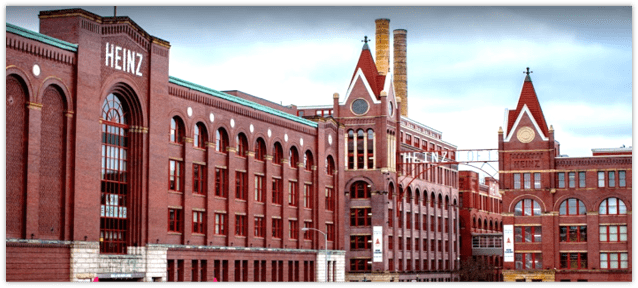Asia Capital Real Estate Lends $29M on Heinz Residential Complex in Pittsburgh
The residential property was one of the last redevelopments to come out of the historic H.J. Heinz Co. manufacturing facility
By Mack Burke May 4, 2021 3:35 pm
reprints
Global private equity firm Asia Capital Real Estate (ACRE) has provided a $28.8 million bridge loan to MCM Company to refinance existing debt on its new residential loft and apartment building called Heinz at 950 North Shore in Pittsburgh’s North Shore area, Commercial Observer has learned.
The two-year loan includes three one-year extension options, and was made at a loan-to-value ratio of 79.8 percent, indicating an asset valuation of roughly $36.1 million. The loan was fully funded and closed on April 30, according to ACRE.
ACRE’s Head of Origination Daniel Jacobs said that MCM’s track record and previous leasing efforts at the property led to his group’s decision to want to lend on Heinz at 950 North Shore. MCM and partner, The Ferchill Group, had managed to lease out all of the property’s 151 lofts and residences by October 2018, about a year and half after it had started leasing the first units that became available after redevelopment.
“As the thriving economic center of one of the great American revival stories, Downtown Pittsburgh is flush with restaurants, nightlife, and other businesses and big tech job creators,” Jacobs said. “With all of this interest being driven from vast demographic pools, there’s never been a better time to build high-quality housing [there].”
MCM and Ferchill were also involved in the Heinz Lofts residential development more than 10 years ago, which was one portion of the massive redevelopment of the former H.J. Heinz Co. industrial and manufacturing complex. Heinz built out its facilities between 1907 and 1958, and the site of MCM’s property was originally built in 1930 and served office space for Heinz employees, according to ACRE. MCM and Ferchill wrapped much of the redevelopment of Heinz at 950 North Shore in 2017, delivering the last handful of 151 one- and two-bedroom residences in the fourth quarter of 2018.
The complex is located in the East Allegheny neighborhood of metropolitan Pittsburgh, just across the Allegheny River from the city’s official “Downtown” area, although the city’s urban center stretches out past both the Allegheny and Ohio rivers that cut through the middle of it, forming its North and South Shore areas.
Heinz at 950 North Shore is located at 950 Progress Street, just a couple blocks from the banks of the Allegheny River, as some of its units offer views overlooking the water and the southern reaches of the city’s downtown.
The property sports one- and two-bedroom units, ranging from 443 to 1,793 square feet, with ceilings heights in some climbing as high as 27 feet, according to information from the property’s website. It also includes bike and kayak storage, a bike repair station, a fitness center and a virtual video fitness studio, a community game room, a climate-controlled parking garage, a riverside trail, and also an outdoor courtyard area with barbecue areas, according to its website and information from ACRE.
Heinz at 950 North Shore is more than 90 percent leased out, as of the end of last month, and is “effectively stabilized,” according to ACRE.
Current monthly rents range from just over $1,400 for the one-bedrooms to nearly $2,400 for two-bedroom units, according to listing information from Apartments.com.
Directly across the Allegheny River from the development is the city’s Strip District, which has recently been called “Robotics Row,” an ode to the growing presence of tech companies in Pittsburgh that are working on robotics, artificial intelligence and autonomous technology.
Massive conglomerate Honeywell, which dabbles in areas like building technologies and aerospace, created a “robotics innovation hub” in Pittsburgh in fall 2019, which was geared toward AI, machine learning, advanced robotics and computer vision.
And, earlier this year, Aurora Innovation also took over a number of office and research sites in Pittsburgh that used to house Uber’s Advanced Technologies Group after the company bought Uber’s self-driving vehicles unit.
Facebook also expanded its presence in Pittsburgh after five years in the city, unveiling its Facebook Reality Labs offices in the Strip District in early 2020, before the pandemic.
City organizations like the Pittsburgh Downtown Partnership have worked hard over the last several years to help draw tech companies to the area and grow its reputation as a tech hub. Outside of some of the bigger names in the city, autonomous driving firm Argo AI and software company Aspinity are others that can claim homes in the city’s Strip District/”Robotics Row.”



